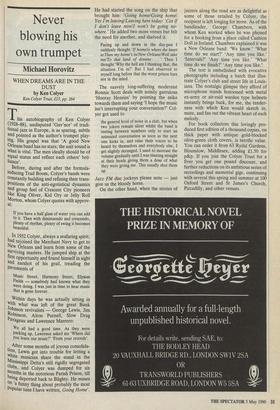Never blowing his own trumpet
Michael Horovitz
WHEN DREAMS ARE IN THE DUST by Ken Colyer
Ken Colyer Trust, £13, pp. 264
This autobiography of Ken Colyer (1928-88), undisputed `Guv'nor' of tradi- tional jazz in Europe, is as sparing, subtle and pointed as the author's trumpet play- ing. His gospel was that 'A good New Orleans band has no stars; the unit sound is what is vital. The men ideally should be of equal status and reflect each others' bril- liance'.
Before, during and after the formula- inducing Trad Boom, Colyer's bands were constantly building and refining their trans- positions of the anti-egotistical dynamics and group feel of Crescent City pioneers like King Oliver, Kid Ory or Jelly Roll Morton, whom Colyer quotes with approv- al: If you have a half glass of water you can add to it. Then with diminuendo and crescendo, plenty of rhythm, plenty of swing it becomes beautiful.
In 1952 Colyer, always a seafaring spirit, had rejoined the Merchant Navy to get to New Orleans and learn from some of the surviving masters. He jumped ship at the first opportunity and found himself in sight and earshot of his grail, treading the pavements of Music Street, Harmony Street, Elysian Fields — somebody had known what they were doing. I was just in time to hear music that is gone forever.
Within days he was actually sitting in With what was left of the great Bunk Johnson revivalists — George Lewis, Jim Robinson, Alton Purnell, Slow Drag Pavageau and Lawrence Marrero:
We all had a good time. As they were packing up, Lawrence asked me 'Where did you learn our music?' From your records'.
After some months of joyous consolida- tion, Lewis got into trouble for letting a White musician share the stand in the Mississippi Delta's still rigidly segregated clubs, and Colyer was dumped for six months in the notorious Parish Prison, till being deported back to Blighty. He muses on 'a funny thing about probably the most Popular tune I have written, Going Home'. He had started the song on the ship that brought him: 'Going home/Going home/ Yes I'm leaving/ Leaving here today/ 'Cos if I don't leave nowt/ won't be going no- where.' He added two more verses but felt the need for another, and shelved it.
Pacing up and down in the day-pen I suddenly thought 'If home/is where the heart is/Then my home's in/New Orleans/Well take me/To that land of dreams . . . ' Then I thought 'Why the hell am I thinking that, the situation I'm in?' But I had observed to myself long before that the worst prison bars are in the mind.
The suavely long-suffering modernist Ronnie Scott deals with noisily garrulous `Hooray Henries' by pointing the mike towards them and saying 'I hope the music isn't interrupting your conversation?' Col- yer got used to
the general level of noise in a club, but when two jokers remain silent whilst the band is resting between numbers only to start an animated conversation as soon as the next one kicks in, and raise their voices to be heard by themselves and everybody else, I get slightly deranged. I used to increase the volume gradually until I was blasting straight at their heads giving them a dose of what they were giving me. This usually shut them up.
Jazz FM disc jockeys please note — just give us the bloody horse. On the other hand, when the stories of jazzers along the road are as delightful as some of those retailed by Colyer, the recipient is left longing for more. As of the bandleader, George Chambers, with whom Ken worked when he was phoned for a booking from a place called Cushion Doll in Ireland. Chambers explained it was a New Orleans band: 'We know.' What time do we start?' Any time you like.' `Intervals?' Any time you like.' What time do we finish?' Any time you like.'
The text is embellished with evocative photographs including a batch that illus- trate Colyer's club and street life in Louis- iana. The nostalgic glimpse they afford of microphone stands festooned with metal ex-army or air-raid warden type helmets instantly brings back, for me, the tender- ness with which Ken would sketch in, mute, and fan out the vibrant heart of each melody.
For book collectors this lovingly pro- duced first edition of a thousand copies, on thick paper with antique gold-blocked olive-green cloth covers, is terrific value. You can order it from 63 Rydal Gardens, Hounslow, Middlesex, adding £1.50 for p&p. If you join the Colyer Trust for a fiver you get one pound discount, and further reductions on its ambitious series of recordings and memorial gigs, continuing with several this spring and summer at 100 Oxford Street and St James's Church, Piccadilly, and other venues.


















































 Previous page
Previous page